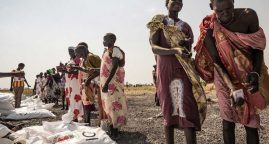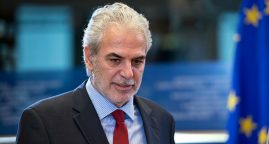The UN is in financial distress, and the US still owes $491 million for 2019
Article published on Yahoo finance website on 01/02/2020 by Aarthi Swaminathan
The United Nations (UN) is running out of money, compounded by the fact that the U.S. — its biggest contributor — still hasn’t paid all of what it owes for 2019.
The U.S. made partial payments to the UN in 2019 but still currently owes about $491 million for the current calendar year, UN Secretary General’s Spokesman Stéphane Dujarric told Yahoo Finance. The most recent payment was made on Dec. 2.
“The U.S. is often late in paying its dues because the U.S. budgetary cycle is different from the UN,” American University Associate Professor Tamar Gutner, an expert on international organizations, told Yahoo Finance. “The UN asked for members to pay their dues in the first month of the calendar year, and the U.S. typically pays in the fall. So that’s been a problem for a long time.”
In October, the UN noted that there was a “growing downward trend” in the organization’s regular budget (as seen in the graph above). And the situation was becoming “more dire than the year before” as the cash deficits, which were happening earlier in the year, tended to “linger longer and run deeper.”
The trend has worsened since member countries like the U.S. — which by itself is responsible for 22% of the regular budget and 28% of the peacekeeping budget — hasn’t paid in full.
‘Our work and our reforms are at risk’
The international organization, which depends on member states for contributions used for activities ranging from staffing costs to missions, said in October that it was facing a severe liquidity crisis and that it could run out of money in just a few weeks.
“This month, we will reach the deepest deficit of the decade,” Secretary-General Antonio Guterres told member states. “We risk exhausting the closed peacekeeping cash reserves, and entering November without enough cash to cover payrolls…. Our work and our reforms are at risk.”
Guterres also called on states to “recommit to paying your financial obligations on time and in full.”
Several countries have since heeded his call, and the UN said then that it had received enough partial payments from countries to pay its staff. But roughly 50 states had yet to pay their contributions in full.
The UN’s Dujarric confirmed that $772 million in payments were still owed overall as of mid-December.
‘This isn’t the first time’
An official from the U.S. mission previously said that D.C. is committed to meeting the payments in the fall. But history suggests that the delay in payments could be a result of political intent.
U.S. President Donald Trump openly criticized the value of the UN during his first visit to the UN headquarters in 2017, when he told the UN General Assembly that the organization was bloated and the U.S. way paying too much.
“We must ensure that no one and no member state shoulders a disproportionate share of the burden and that’s militarily or financially,” Trump stated. The U.S. president maintained that stance in October this year.
“These tensions have happened in the past as well,” added Gutner. “There was a crisis in the 1960s — it wasn’t the U.S. but the Soviet Union and France were withholding their payments because they were upset about the peacekeeping mission in Congo. And in the ’80s and ’90s there were issues between the U.S. and the UN, with the U.S. withholding money because they wanted to negotiate a lower share for [their] contribution to the UN budget, and they wanted to extract other concessions. So this isn’t the first time.”
Related Articles
“Massive scaling up urgently needed to tackle hunger crisis” says ICRC’s Director of Operations
03/22/2017. The ICRC is appealing for $400m to help those most affected by the humanitarian crises in Somalia, Yemen, South Sudan and north-east Nigeria
Extreme weather hit 60 million people in 2018, no part of the world spared
01/24/2019. The study showed that earthquakes and tsunamis claimed more lives than any other type of hazard.
Fixing the world’s humanitarian crises
05/18/2016. Christos Stylianides is the EU Commissioner for Humanitarian Aid and Crisis Management.






